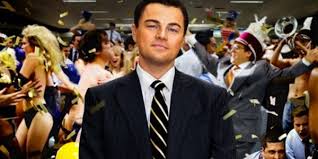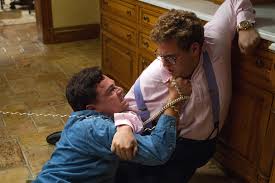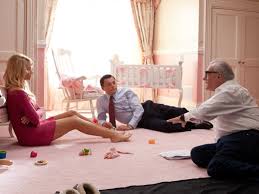
Rated R for sequences of strong sexual content, graphic nudity, drug use and language throughout, and for some violence
Mad Cow’s Rating: 2 ½ cowbells
The Wolf of Wall Street is a misogynist movie with great production values, writing, and acting. Its “message†is in the eye of the beholder. The NYT reviewer A.O. Scott asked “Is the movie satire or propaganda?†and wondered if director Martin Scorsese were condemning or perpetuating the themes of the story. From what I can tell it’s a straightforward story calculated to be comedic and pretending to have no point of view.
 Jordan Belfort, who lived the story, is supposedly very funny in his accounts of his life, in his book and in real life. There’s no accounting for taste. The film should be highly recommended to people who find drug addiction, greed, and misogyny funny. Some say this is the most explicitly sexual major motion picture ever made and sets a record for the number of times the F-word is spoken, beaten only by a movie about the F-word. Wohoo. I guess Scorsese just couldn’t leave the porn on the internet.
Jordan Belfort, who lived the story, is supposedly very funny in his accounts of his life, in his book and in real life. There’s no accounting for taste. The film should be highly recommended to people who find drug addiction, greed, and misogyny funny. Some say this is the most explicitly sexual major motion picture ever made and sets a record for the number of times the F-word is spoken, beaten only by a movie about the F-word. Wohoo. I guess Scorsese just couldn’t leave the porn on the internet.
Leonardo DiCaprio lights up the screen as Belfort, a crooked stock broker and charismatic salesman who clawed his way to the top and brought hundreds with him. An unrepentant Belfort wrote a book about his life while spending 22 months in federal prison for his various misdeeds. Terrence Winter (Boardwalk Empire, The Sopranos) wrote the screenplay based on the book. Belfort, who today is a motivational speaker who teaches salesmanship, told all. Scorsese took it from there. Although there is a disclaimer, most of the characters are based on real people and many of the names have not been changed.
At the start of the film Belfort is lectured by seasoned broker Mark Hanna (a slim Matthew McConaughey, Dallas Buyers Club) that being a broker is not about making money for clients, who after all make money on paper, brokers’ commissions go right into the bank. Due to the 1987 market crash, Belfort has to start on Long Island with penny stocks. He’s so good at salesmanship and illegal pitches that he  quickly starts his own firm, Stratton Oakmont, with his first partner Donnie Azoff (Jonah Hill, Moneyball), a druggie who lives in his building, plus old pals whose major experience has been in selling pot. They are uneducated and/or not very bright, but they learn to sell, the easy illegal way.
quickly starts his own firm, Stratton Oakmont, with his first partner Donnie Azoff (Jonah Hill, Moneyball), a druggie who lives in his building, plus old pals whose major experience has been in selling pot. They are uneducated and/or not very bright, but they learn to sell, the easy illegal way.
Several plots run simultaneously in the movie, each escalating for three long hours. The trajectory of Jordan’s addiction runs the usual cinematic course from fun to maintenance to chaos to bordering on disaster. His drug of choice is Quaaludes. Belfort taught DiCaprio the stages of high and the behaviors produced – tingle, slur, drool, and amnesia. At one point in the movie Belfort, having ingested too much too quickly gets to the spastic “cerebral palsy†stage – funny, eh? His addiction is played for laughs, with the possible exceptions of slapping his wife or trying to kidnap his young daughter. Yet the more consistent movie visual is the sight of women’s naked bodies during public orgies and private liaisons, complete with jokes about women’s body parts. Money is just the backdrop to it all. 
Women are a commodity to be had and the more money one (that “one†being male) has the more beautiful the woman, not to mention what she is willing to do for money. Belfort mentions more than once that men with little money go home with ugly wives and drive ugly cars. Wives, like cars, can be replaced for newer models. The “wives†in the movie behave like real people (albeit extremely sexy and normatively gorgeous). They take care of homes and children and have feelings seemingly absent in the men, but needless to say Scorsese doesn’t develop their characters much. He focuses instead on how much fun the men are having. Belfort reports in the book that they had “hookers in the basement, drug dealers in the parking lot, [and] exotic animals in the boardroom.†Ha. Ha. We miss the exotic animals but are treated to “midget-tossings,†held once a week in the office.
No major studio was willing to take the picture on because of its explicit sex. First-time movie producers Riza Aziz and Joey McFarland took it on independently under the Red Granite banner. Former investment bankers, they got most of the funding (estimated to be at about $100,000,000) from the Middle East. Yet Scorsese had to edit some explicit sex out in order to avoid an NC-17 rating.
 It is telling that the sex scene that needed toning down was of a gay orgy, an incidental part of the movie featuring the escapade of a gay valet that Belfort hired. Digital changes were made so that the men’s genitals would not be exposed. In fact, few naked men appear in the movie, genitals or not, compared with lots of full-frontal and all-around female nudity.
It is telling that the sex scene that needed toning down was of a gay orgy, an incidental part of the movie featuring the escapade of a gay valet that Belfort hired. Digital changes were made so that the men’s genitals would not be exposed. In fact, few naked men appear in the movie, genitals or not, compared with lots of full-frontal and all-around female nudity.
Does a movie have to be a morality tale? Does it have to have a point of view? Of course not, but the latter is hard to avoid because of the thousands of choices that go into making a movie. Scorsese made some choices and so did the actors, who improvised a great deal. It’s not “just†a story. About a small firm, it isn’t even about the players in the huge stock market scandals. For that, go to Margin Call or Arbitrage.
The actors laugh their way through the film, in the worst kind of out-of-control frat party. They are like Mad Men on steroids but the historical period is not the 1960s but the 1990s. For whom is this stuff fun? As with The Hunger Games, which pretends halfheartedly to be a cautionary tale, the viewer is invited to be a part of it all, to be the corruption in all of its glory, including cheating lower-income people out of their money, doing drugs, and demeaning women.
 DiCaprio is spectacular in this role. One can feel Belfort’s charisma and know that his persuasiveness is almost unstoppable. He has no inner life. One can understand that in real life Belfort occasionally has lunch with the FBI agent, Greg Coleman, who put him in prison (named Patrick Denham in the movie and played sensitively by Kyle Chandler). Yet it is well to note that among all of his “vices†Belfort has given up only drugs and alcohol, probably knowing that he was going to die if he didn’t. Whether he gave up illegal activity could be open to question. But money and women, not at all. What’s there to apologize for?
DiCaprio is spectacular in this role. One can feel Belfort’s charisma and know that his persuasiveness is almost unstoppable. He has no inner life. One can understand that in real life Belfort occasionally has lunch with the FBI agent, Greg Coleman, who put him in prison (named Patrick Denham in the movie and played sensitively by Kyle Chandler). Yet it is well to note that among all of his “vices†Belfort has given up only drugs and alcohol, probably knowing that he was going to die if he didn’t. Whether he gave up illegal activity could be open to question. But money and women, not at all. What’s there to apologize for?
Richard Brody of The New Yorker had this to say about the movie. “Anyone who needs The Wolf of Wall Street to explain that the stock market fraud and personal irresponsibility it depicts are morally wrong is dead from the neck up; but anyone who can’t take vast pleasure in its depiction of delinquent behavior is dead from the neck down.†And just who do you mean by “anyone†mister?
The issue here is not just of misogyny, the hatred of women, or even the debasement or abuse of women. It’s to do with the dehumanization of women. Brody, and probably many men like him, wasn’t even thinking of women when he wrote the above statement about anyone enjoying the delinquency. How could he? “Anyone,†whether conscious or not, just meant men.
I shudder to think that this is supposed to be the era of “post-feminism. Coincidentally, a letter from Dylan Farrow about the alleged sexual abuse imposed on her by Woody Allen when she was seven, has just been published in the New York Times. Hollywood has started to circle the wagons, as it has done about convicted child molester Roman Polanski. I suggest here that movies such as The Wolf of Wall Street create a backdrop, permission if you will, for all sorts of abuse towards women.
*NOTE: All uncited information in this review is from the Internet Movie Data Base IMDB trivia section about this movie.



